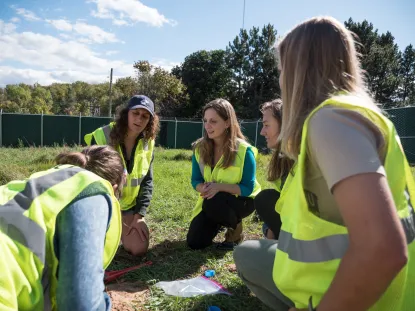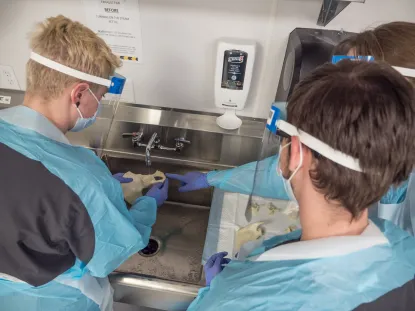Experience Learning
Are you interested in understanding how humans lived in the past, and how they behave and interact now? So are we! In our department, you will learn how human action and consciousness both shape and are shaped by the surrounding social and cultural worlds. You can explore courses such as Social Class, Power, and Mobility, Socio-Cultural Anthropology, or Death, Dying, and Grieving. You can study forensic anthropology to learn methods that help find a missing person or even solve a murder. You can work with faculty on researching societal responses to climate change or excavating an archaeological site. We emphasize providing students with the experiences and skills necessary to apply knowledge in real-world contexts.
Career Excellence
Students in our program develop marketable skills in research and in applying an understanding of how social systems operate. These skills are relevant to careers in criminal justice, health care, public administration, education, law, business and many more fields of interest. Our undergraduate program also prepares students for advanced study in graduate school. The conceptual and critical thinking skills students gain in our program are intended for world-readiness, which goes beyond the essential goal of near-term workforce readiness to empower students for life, work, and citizenship in an age of daunting challenges in need of world-embracing solutions.
Research with Faculty Members
Students in the sociology and anthropology department have the opportunity to study with faculty. Archaeology students have numerous opportunities to engage in field work, gaining experience in excavating and cataloging artifacts. Our new minor in Food, Environment and Society combines courses in anthropology, environmental science, geography and health and nutrition to examine the complexities of food systems and more sustainable socio-ecological practices.
Image

FROST
The NMU Forensic Research Outdoor Station (FROST) is an outdoor research facility that facilitates research and education intended to advance knowledge and understanding of forensic taphonomy, anthropology, decomposition and other forensic sciences, especially as they are affected by considerable snow accumulation and repeated freezing and thawing in a high-latitude climate.
Degrees Offered
Image

What You Will Do at NMU
Students in the Sociology and Anthropology Department learn about social problems, group dynamics, cultural diversity and the forces associated with social change in a global community. Students also gain an understanding of cultural processes that shape individual and group behavior, and will acquire skills in conducting and evaluating social research.
If you enjoy internships working in community organizations, conducting innovative research under the supervision of an expert, studying cultural landscapes in distant lands or doing archaeological research uncovering ancient ruins, you have found the right place.
The Sociology and Anthropology Department offers exciting opportunities for students to collaborate with their professors and their peers in exploring the human condition. We encourage experiential learning opportunities that foster the development of knowledge and skills. Whatever path you choose, you will find mentors in our program who help you every step along the way.
